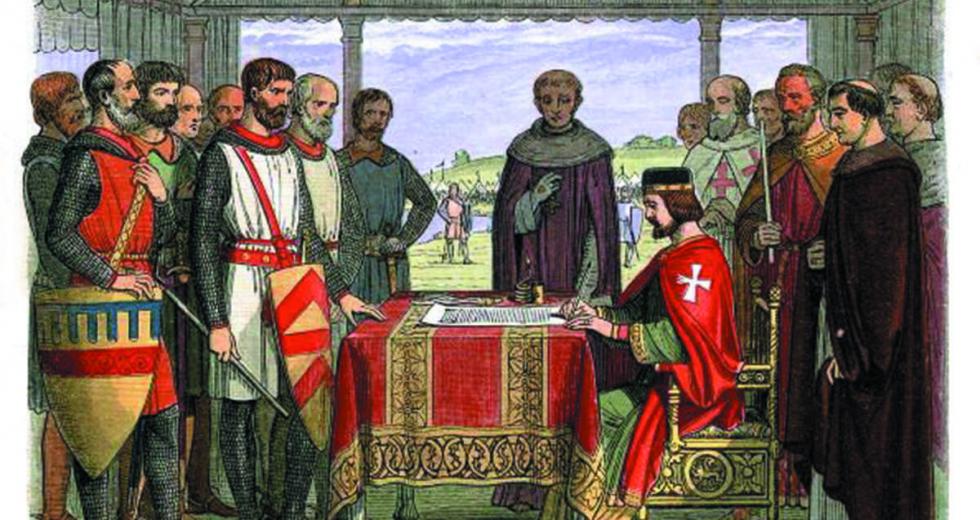
No free man shall be seized or imprisoned, or stripped of his rights or possessions, or outlawed or exiled, nor will we proceed with force against him except by the lawful judgement of his equals or by the law of the land. To no one will we sell, to no one deny or delay right or justice.
Magna Carta, like the much later Bill of Rights, was a peace treaty. Wikipedia would have us believe that Magna Carta was drafted to "make peace between the unpopular King and a group of rebel barons".
"Rebel barons"? The implication is that the barons were terrorists, or traitors.
They were neither of these things and in truth all sections of society were represented at Runnymede: barons, knights, clergy and townspeople.
The suggestion that the King was simply unpopular is another misrepresentation, at best.
Lord Blackstone, most famous for having written his Commentaries on the Laws of England, also wrote a book on Magna Carta. This is what he had to say of the circumstances leading to the constitutional convention which led to Magna Carta:
On the 5th May, the barons, having chosen as their leader, Robert Fitzwalter ... performed the solemn fuedal ceremony of diffidatio, or renunciation of their fealty and homage, a formality indispensible before vassals could, without infamy, wage war upon their feudal overlord. Absolved of their allegance ... they marched on London.
What this demonstrates is that an oath of allegiance which one might assume is for life, is not, and so allegiance can be withdrawn if the Monarch is in breach of their contract with the people.
Blackstone continues:
It was on the 15th June, then, in the year 1215, that the conference began between John, supported by a slender following of half-hearted magnates, upon the one side, and the mail-clad barons, backed by a multitude of well-armed knights, upon the other. The conference lasted for eight days, from Monday of one week till Tuesday of the next. On Monday the 15th, John set seal to the demands presented to him by the barons, accepting every one of their "Articles," with the additional "Forma Securitatis" or executive clause, vesting in twenty-five of their number full authority to constrain King John by force to observe its provisions.
Magna Carta was a peace treaty, designed to reign in an out of control monarch intent on destroying the rights and liberties of everyone.
It was also a common law contract. As such, it is not subject to repeal by Parliament, since no Parliament was party to that contract. But this is the key point: Magna Carta did not create new rights or liberties. It was not a starting point. It was a reassertion of rights and liberties which already existed; a demand that the monarch respect them.
So what has changed in the last 800 years?
Not much, it seems.
Our relationship with the monarch has changed, of course. Her constitutional role - her job spec - as defined in the Coronation Oath Act 1688, is to protect the historic laws and customs upon which this nation is founded. This she has utterly failed to do, and so her attendance at Runnymede today is so utterly hypocritical as to be laughable.
As a result for her failure we have a government so out of control and so determined to destroy once and for all the rights and liberties represented by Magna Carta and so many other constitutional documents.
In 1215, the constitutional convention was established by those determined to see traditional rights and liberties upheld and reasserted. Today, our out of control government is cooperating with globalists and corporatists to organise modern day "constitutional conventions", designed to destroy hundreds of years of protections.
We are at war with our government once again. So far it is an information war, and we can all hope that that is how it will stay. Somehow in that information war, those of us who recognise the critical importance of our constitutional heritage to future generations must find a way to make our voices heard above the clamour of the "reformers".
We must reassert what is rightfully ours, and require Parliament to do what it at present refuses to do: respect the rule of law.
So today, let's celebrate Magna Carta and try to understand what it really represents. Then tomorrow, join the fight to reassert our rights.

